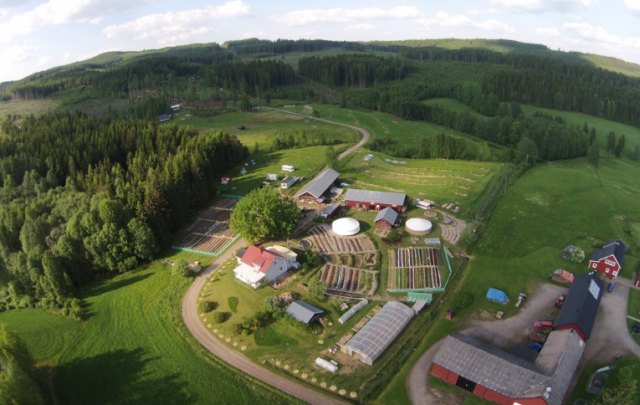The British love their woodlands; if there was ever any doubt about that, the outraged protests when this Tory government suggested selling off publicly owned forests, made this very clear. But how these woods are valued today is very different to how they were valued in the past.
Today we see the woods as somewhere we go to walk the dog, where we have picnics and cycle rides. They have mostly become places of leisure where we take the kids to teach them about nature, gather some conkers and acorns and let them run wild for an hour or so.
The essential forest
 How different a picture this is from earlier times when the forests provided for much more essential needs. Rabbits, boar and deer were hunted for food and firewood was collected to cook the catch and keep us warm. We gathered nuts, berries and mushrooms and dried them for winter. The streams provided fish and water to drink. We used bark to make crude baskets and brambles to rub and twist into string. In those days, the woods were our home and larder. Later we learned more sophisticated ways of exploiting the many resources the forest provided and taught ourselves to make charcoal, to coppice hazel and chestnut, to weave willow, to cut larger trees for fine carpentry and cabinet making and we could not have imagined our lives without good, British broad leaf timber.
How different a picture this is from earlier times when the forests provided for much more essential needs. Rabbits, boar and deer were hunted for food and firewood was collected to cook the catch and keep us warm. We gathered nuts, berries and mushrooms and dried them for winter. The streams provided fish and water to drink. We used bark to make crude baskets and brambles to rub and twist into string. In those days, the woods were our home and larder. Later we learned more sophisticated ways of exploiting the many resources the forest provided and taught ourselves to make charcoal, to coppice hazel and chestnut, to weave willow, to cut larger trees for fine carpentry and cabinet making and we could not have imagined our lives without good, British broad leaf timber.
The value of trees to our ancestors was also reflected in their spiritual life; druids were the keepers of tree lore by the use of the tree alphabet or Ogham in which each tree had its characteristics and uses as well as it’s own lunar month. In part, trees known in this manner helped the people to understand and order the world around them. Few of us still keep this knowledge; it’s mostly gone from our experience of the forest, just like we are no longer familiar with the ancient tradition of the many woodland crafts that used to provide valuable timber products and worthwhile livelihoods for skilled craftspeople. So when we wonder through our woods during the autumn when trees are putting on a blazing display of colour, what we perceive is but a pretty picture, in contrast to our forebears, to whom the forests would have spoken volumes.
A return to the woods
Some inspiring individuals however, are working to change all that, despite the public’s lack of understanding of the true importance of our native hardwoods and the competition of cheap imported timber and related products. In the face of increasing unemployment, they are working hard to re-establish the value of well managed woodlands.
 It’s a cold autumn day when I go to meet Bob Shaw in a woods south of Aberystwyth. At Coed Tyllwyd I find a hive of activity; chainsaws are rumbling away, pole lathes are set up under a temporary canopy and there’s a number of people wielding axes and spokeshaves with considerable skill. What I notice most is that all this activity has the feel of a professional business; the “volunteers” are focussed on their projects, there is quite a pace of work and none of the hanging about you usually get at volunteer work days. That because I’ve just walked into the production area of Tir Coed‘s latest project: Wise Woods Wales (WWW), a social enterprise aimed at teaching woodland management and carpentry to mostly young and unemployed people. Their tagline “Building Skills, rebuilding People” says it all, really!
It’s a cold autumn day when I go to meet Bob Shaw in a woods south of Aberystwyth. At Coed Tyllwyd I find a hive of activity; chainsaws are rumbling away, pole lathes are set up under a temporary canopy and there’s a number of people wielding axes and spokeshaves with considerable skill. What I notice most is that all this activity has the feel of a professional business; the “volunteers” are focussed on their projects, there is quite a pace of work and none of the hanging about you usually get at volunteer work days. That because I’ve just walked into the production area of Tir Coed‘s latest project: Wise Woods Wales (WWW), a social enterprise aimed at teaching woodland management and carpentry to mostly young and unemployed people. Their tagline “Building Skills, rebuilding People” says it all, really!
Bob tells me how Tir Coed works a lot with young people that have run into “some trouble one way or another” and how by providing them with training they gain skills that not only boosts their confidence, but will hopefully lead to meaningful employment. The young people’s enthusiasm for this project shows in their comments:
“This is brilliant, why did I not know about this before? I want to work in the woods for the rest of my life, I don’t want to go home!”
The only problem is”, sighs Bob, “is that we train them up, they get all the skills and are really keen to get out there and work, but there’s no work available for them.” This is where Wise Woods Wales comes in; they are seeking to make small, neglected woods worthwhile again in many ways, not just by developing a market for their hand crafted products and providing skilled employment, but also by raising awareness of the need for sustainably managed woods, their potential resource value, their importance as biodiverse ecosystems and as places for people to connect with nature.
Woodlands like Coed Tyllwyd are no longer commercially viable. With poor access, a steep gradient and small in size (65 acres), the current low value of timber wouldn’t pay for harvesting the trees the usual, mechanised way. But Wise Woods Wales doesn’t just deal in timber. By turning the trees into saleable products, right where they grow, without the need for expensive workshops and equipment, they add value to the raw materials, just like the farmer who now produces sausages rather than pigs or the fruit grower who sells juice. Unfortunately cheap imported timber products are very difficult to compete with. Rob Smith, WWW’s activities manager, tells me:
“ It’s hard to get a good price for a sturdy, handmade chair. In today’s throw- away culture you can buy a chair for £30 in certain Scandinavian furniture superstores. People don’t know the value of durable things anymore.”
By this time my toes have a distinct icy feel to them and I wish I had brought a hat and gloves. As a gentle drizzle starts, I decide it’s time to leave his hardy lot to their work and make my way down the hill. I’ve learned so much here today, far more than I can put into this article. What I noticed most though, is how enthousiastic and alive the workers here are, they simply love what they do, despite it being hard work in not always comfortable conditions. But it’s certainly "right livelihood", as Buddhist call it, work that does more than just pay the bills, it repairs the damage to land and to people, caused by an uncaring industrial growth system with a singleminded focus on profit.
Taking the community to the woods
 There’s a sweet little story to how WWW came into the management of Coed Tyllwyd: It isn’t just that harvesting the trees wouldn’t be commercially worthwhile for its owners, the Forestry Commission, but also that the only access to the woods is through a very built up area with narrow streets and lanes and the locals are strongly opposed to large timber lorries thundering past their front doors for weeks on end. Tir Coed took the community through a process called a participatory rural appraisal or PRA, in which they hired the local village hall and held a series of meetings over 2-3 months, where local people could come and have their say about what should happen in “their” local woods.
There’s a sweet little story to how WWW came into the management of Coed Tyllwyd: It isn’t just that harvesting the trees wouldn’t be commercially worthwhile for its owners, the Forestry Commission, but also that the only access to the woods is through a very built up area with narrow streets and lanes and the locals are strongly opposed to large timber lorries thundering past their front doors for weeks on end. Tir Coed took the community through a process called a participatory rural appraisal or PRA, in which they hired the local village hall and held a series of meetings over 2-3 months, where local people could come and have their say about what should happen in “their” local woods.
Bob explains: "The only problem with a PRA is that you are asking the public’s opinion about something they know very little about, so that meant Tir Coed had to be very open and honest about what it was they wanted to do and why. Once the locals understood the economic, social and ecological value of the resource right on their doorstep, they were very positive about the project". Bob and his volunteers have also been busy clearing footpaths through the woods, putting in dog gates and stiles and thus encouraging the community to come out and take an interest in their local woods.
Here is a project that would be a dream partner for a local transition initiative, it ticks all the boxes: reskilling, natural renewable resources, local enterprise, community. It wouldn’t be the first time that a T initiative starts a conversation with landowners regarding land use. Alas, Aberystwyth’s transition group gave up the ghost years ago and I haven’t heard of any other T groups in the area, but maybe where you, the reader, is part of a thriving initiative which is wondering what to do next? Maybe it’s time to go and check out that old, neglected woods down the lane and discover it’s hidden treasures.





